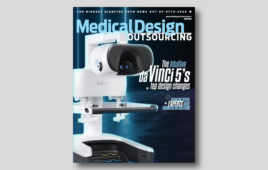
(Image by Jose Fontano on Unsplash)
The recent shutdown of a Sterigenics medical device sterilization plant in Willowbrook, Ill. has affected medtech giants such as Becton Dickinson (NYSE:BDX), Boston Scientific (NYSE:BSX), Medtronic (NYSE:MDT), Smith & Nephew (NYSE:SNN) and Stryker (NYSE:SYK), according to an FDA list of devices processed at the sterilization plant.
Medium-sized and smaller firms, including Teleflex (NYSE:TFX), Arthrex and ArthroCare also had devices processed there. The Willowbrook plant sterilized 594 types of devices, including sutures, clamps, knives, stents and needles. With a Viant sterilization plant in Grand Rapids, Mich. slated to close later this year, the FDA is warning of spot shortages, and smaller medtech companies may be the hardest hit.
Both plants use the carcinogenic gas ethylene oxide (EtO) to sterilize devices. Viant had reported an EtO leak to the Michigan Department of Environmental Quality (MDEQ) in 2017. The department issued a violation to the company then and another following an MDEQ inspection in November 2018. The Viant plant sterilizes 46 types of devices, including catheters and surgical mesh, according to the FDA. Medplast acquired the plant in 2015 and changed its name to Viant in July 2018.
A Becton Dickinson (BD) spokesman told Medical Design & Outsourcing in an email that BD uses both in-house sterilization facilities and third-party providers, including Sterigenics, to sterilize products according to requirements established by the FDA.
“With the Sterigenics facility in Willowbrook closing, we have transferred our sterilization volume (less than 1% of BD products sold) from the Willowbrook facility to other sterilization centers in compliance with our regulatory filings and to ensure product safety and efficacy,” the company spokesman said. “Because we successfully transferred these products to another facility, we have been able to continue to supply products to customers uninterrupted.”
Most of the more than 100 companies whose devices were sterilized at the Sterigenics plant have remained publicly mum on the effects on their businesses, but they are apparently talking with the FDA and trade groups. The Minnesota-based Medical Alley Association has also been talking to members of Congress. The group sent a letter in February alerting Minnesota’s congressional delegation to the Sterigenics plant closure and asking them to take action. Republican U.S. Rep. Tom Emmer penned a letter to the FDA, signed by the rest of the state’s House members, asking for help. The agency issued its first warning about possible device shortages March 1.
The Sterigenics plant closure is “causing some issues for some of our members,” Medical Alley president & CEO Shaye Mandle said in an email.
“Because of its proximity, it is a common vendor for many companies in the Midwest,” added the group’s VP of intelligence, Frank Jaskulke. “These companies range from startups to large firms and everywhere in between… We are working with our members and the FDA to ensure there are no disruptions in supply.”
The larger companies tend to work with multiple sterilization sites, but the smaller companies don’t always have the volume to secure a second site, Jaskulke said. Unlike other industries in which suppliers can be changed quickly, medtech companies must secure FDA approval to change suppliers. This is a complex process that can typically take anywhere from three to six months, but because the Sterigenics plant was a preferred source for many manufacturers, other sterilization sites will have increased demand and the process is likely to take even longer, Medical Alley wrote in its letter to members of Congress.
Because the Sterigenics plant closure was so abrupt, many small- and medium-sized medtech manufacturers did not have notice or time to begin the process of changing suppliers, the trade group added. Many had less than a two- or three-months supply of their products sterilized at the time.
The FDA has said it will work with manufacturers that need to find other sterilization sites.
The Massachusetts Medical Device Industry Council (MassMEDIC) is closely monitoring the situation, according to group president Brian Johnson. AdvaMed declined to discuss what it’s hearing from members, focusing instead on how the loss of two EtO plants could affect the industry as a whole.
The Illinois Environmental Protection Agency issued an order Feb. 15 to stop the Willowbrook facility from sterilizing medical and other products using ethylene oxide, after the U.S. Center for Disease Control and Prevention’s Agency for Toxic Substances and Disease Registry concluded that “an elevated cancer risk exists for residents and off-site workers in the Willowbrook community surrounding the Sterigenics facility,” referencing a “30-fold increase in cancer potency.”
Industry groups such as the Chemical Industry Council of Illinois are complaining that state regulators set a bad precedent shutting down a plant that previously been found compliant with state and federal regulations. The shutdown was the result of a “confluence of bureaucratic overreaction, inflammatory press coverage and the political power of a new governor [J. B. Pritzker, a Democrat] determined to satisfy the complaints of nearby residents,” according to Legal NewsLine, which is owned by an institute affiliated with the U.S. Chamber of Commerce.
In its March 4 letter explaining its plant’s upcoming closure to nearby residents, Viant said that sterilization work “is not part of our core business.”
Here is an FDA list of all the devices processed at the Willowbrook sterilization plant.





Bureaucratic overreaction is indeed the nemesis of a huge realm of activities. The problem comes mostly from a mix of making decisions based on emotions and data that may not be understood at all. This instance is an example of a decision based on one person’s claims and no consideration of any other information, nor of the secondary consequences. Bureaucrats seldom are even able to imagine the secondary results of their actions, and the probable lack of a wide variety of medical supplies that would be caused is no exception.